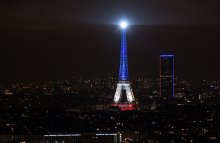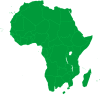
The year 2015 has been particularly bloody. In this article I reflect on what all this violence and turmoil should mean to us. I do this by considering two particular attacks.
The violence which this year has seen is legion. The ongoing war in Syria is driving hundreds of thousands of refugees to the West. The USA has experienced a mass shooting most days of the year, a fact which is providing rich fuel for the fire of political debate leading up to the presidential election next year in that country. In Israel and Palestine, following the war from last year, the violence this year has been more subversive, with regular stabbings by Palestinians on Israeli targets (and, to be sure, Israeli retaliations). Even in docile Sweden was blood shed at a school. And now tension is building between two major nations, Russia and Turkey.
Indeed, we have moved very far away from the modernistic utopian ideal which was just over the horizon at the advent of this millennium.
But, ten years from now, what most of the world will remember about 2015 may very well be the two attacks in city of love and romance, Paris. The attacks have bookended the year somewhat and framed it with discussions about Islam, freedom of speech, minority communities, immigration, gun control and, of course, the basic fear for safety and security.
Of Perpetrators and Victims
In the night of 13 November 2015, a series of attacks were orchestrated across Paris, which would claim the lives of about 130 people. This is a stunning number of people to be killed in peace time, and especially in the safety of one of Europe's most cherished and precious cities.
The next day, the victims lay on cold steel tables in impersonal morgues. They would never again feel pain, loneliness or cold, or be stressed about their work, or be exasperated by dramas in their personal lives. But they would also never feel the warmth of the sun on their faces, the caress of a lover, hear a joke or enjoy a delicious meal. Their lives snuffed out, it was now a matter for their remains to be interred in the ground or cremated, and, ultimately, fade from history's memory (at least as individuals).
Also in the next day, the perpetrators of these attacks too were in the morgues. But they were awakened by a whisper, as if coming from a distant place. They sat upright there, on the steel tables, and before them were Munkar and Nakir: the angels who test the faith of the dead. Being unable to lie at this point, the attackers were asked who their lord is, who their prophet is, and what their religion is. Having answered correctly "Allah", "Muhammad" and "Islam", they were allowed to have a peaceful and pleasant rest in death. This mini judgement will eventually be followed by the final judgement, in which Allah will judge all people. We cannot know the mind of Allah and cannot predict how he will judge, but having confessed the Shahada1, performed Salat2, been charitable (if able), fasted when appropriate and participated in the Hajj3 will dramatically increase one's standing before Allah. If the attackers did do all of these things, then even if the Paris attack was not pleasing to Allah, they may well yet still be allowed into paradise.
The reason I write all of this is to point out the worldviews of the two "sides". France is an extremely secular and irreligious country, so it is safe to assume, I think, that many of victims were atheists. Their lives, with the mere appearance of meaning, came to an end and that is it. But the attackers had very different beliefs. They believed that what they were doing was right and righteous. Whether it objectively was or not does not matter: we can argue all we want on the Internet message boards on whether Islam is peaceful or incentivises violence, or the merits of the various individual hadiths, but the fact remains that what the attackers believed were so firmly ingrained in them that it drove them to spectacular action.
The point is that people are largely shaped and defined by what they believe. The battle is lost long, long before someone reaches a metal detector or police checkpoint. Once a person has become convinced that a cause, no matter which one, is worth dying for, that person becomes truly formidable. The only way to change this, is for that person to experience a radical transformation of the heart: the kind that secular therapies and education systems cannot achieve.
An Aside
While many Muslims denounce these attacks, I do have to wonder—sincerely—whether these Muslims who are also sheikhs, imams and du'at4 secretly appreciate these acts of violence insofar as it brings (sometimes positive and sincere) interest to Islam from people in the West who would otherwise be difficult to engage. This, then, actually helps the message of Islam to spread. As the left hand washes the right hand, do these acts which are condemned as reprehensible actually further the cause of Islam among the peaceful?
Of Occasions
My second point will be briefer than the previous one. The fact that these attacks happened in Paris, and that attacks happen in the USA and Israel where security checks are taken very seriously, means that it can happen anywhere. It is no longer valid to think that such a thing cannot happen in one's own country or city. Now, there is very little that can be done about this and I definitely do not want to cause alarm, but I do think we are moving from the utopia that we were all made to believe could be achieved with education, social services and the right economic opportunities towards a dystopia which is not really all that unique. Mankind has generally existed in a state of strife and uncertainties throughout its history. It is only recently that we have come to take safety and security for granted. But those who lived in huge, seemingly impenetrable walled cities in ancient times saw them being breached, and elsewhere the peasants—once safely nestled in the heartland of an empire—would be exposed to and be at the mercy of the advancing enemy. This has been the beat to which humanity has marched for millennia and, contrary to popular belief, we have not advanced beyond it. It is tragic, yes; my prayer is that we all will indeed be safe. But if we are not, then we cannot be surprised. What this year has shown us, is the natural state of man's heart: not the ideal we were made to expect.
Conclusion
The days of the 2015 calendar were crossed off using bloody marks. Many memorial plaques and grave stones will bear the dates of people who obviously passed away too soon. To the idealist humanist, the bloodshed of this year must have been a confounding frustration which detracts away from the utopia where "everyone just gets along". But the Christian understands that this is, tragically, merely an outworking of the fallen and sinful nature of mankind. And the solution to this deep underlying problem is Christ Jesus, through whom we can understand the true value (which those who commit violence do not understand) and meaning (which the irreligious cannot know) of human life and freedom. When James and John wanted to call fire and brimstone down on the Samaritan town for refusing them passage, Jesus rebuked them sharply5. And when Peter wounded Melchus with a sword, he too was rebuked6. Jesus Himself is the peace that humanity so desperately desires7, yet His reign is resisted, and therefore there cannot be peace8.
Yet it was Jesus who was the One to suffer violence. And so He intimately understands those who have suffered this year, just as He understands all else that we endure because of the sin of others:
Surely he has borne our sickness,
and carried our suffering;
yet we considered him plagued,
struck by God, and afflicted.
But he was pierced for our transgressions.
He was crushed for our iniquities.
The punishment that brought our peace was on him;
and by his wounds we are healed.
All we like sheep have gone astray.
Everyone has turned to his own way;
and the Lord has laid on him the iniquity of us all.— Isaiah 53:4–6
The Charlie Hebdo attack happened in the first week of the year, and we have more than a week left in this year. May God have mercy on all of us in this time when we look back at His gift to us this: the gift of true peace.
- 1. The Shahada is the basic declaration of faith in Islam, and its recitation is counted as one of the Five Pillars. It is to be the first words a Muslim is to hear at birth, the last (if possible) before death, and is also said during daily prayers. It is also the most basic requirement to initially convert to Islam.
- 2. Salat is the daily, ritualised prayers a Muslim is required to perform.
- 3. The Hajj is the yearly pilgrimage to Mecca which every Muslim must try to undertake at least once during their lifetime.
- 4. The du'at (plural of da'i) are those Muslims (lay or otherwise) who practise da'wah, which is to "seek to renew the Muslim faith, proselytise non-Muslims, and combat false teaching".
- 5. Luke 9:54–55.
- 6. John 18:10–11.
- 7. Isaiah 9:6.
- 8. Luke 12:49–53.
- . Photo credit: JP2H.







Comments
Open Doors indicates increased Christian persecution in 2015
Open Doors has indicated that in 2015 the "global persecution of Christians is more extreme than ever" before.